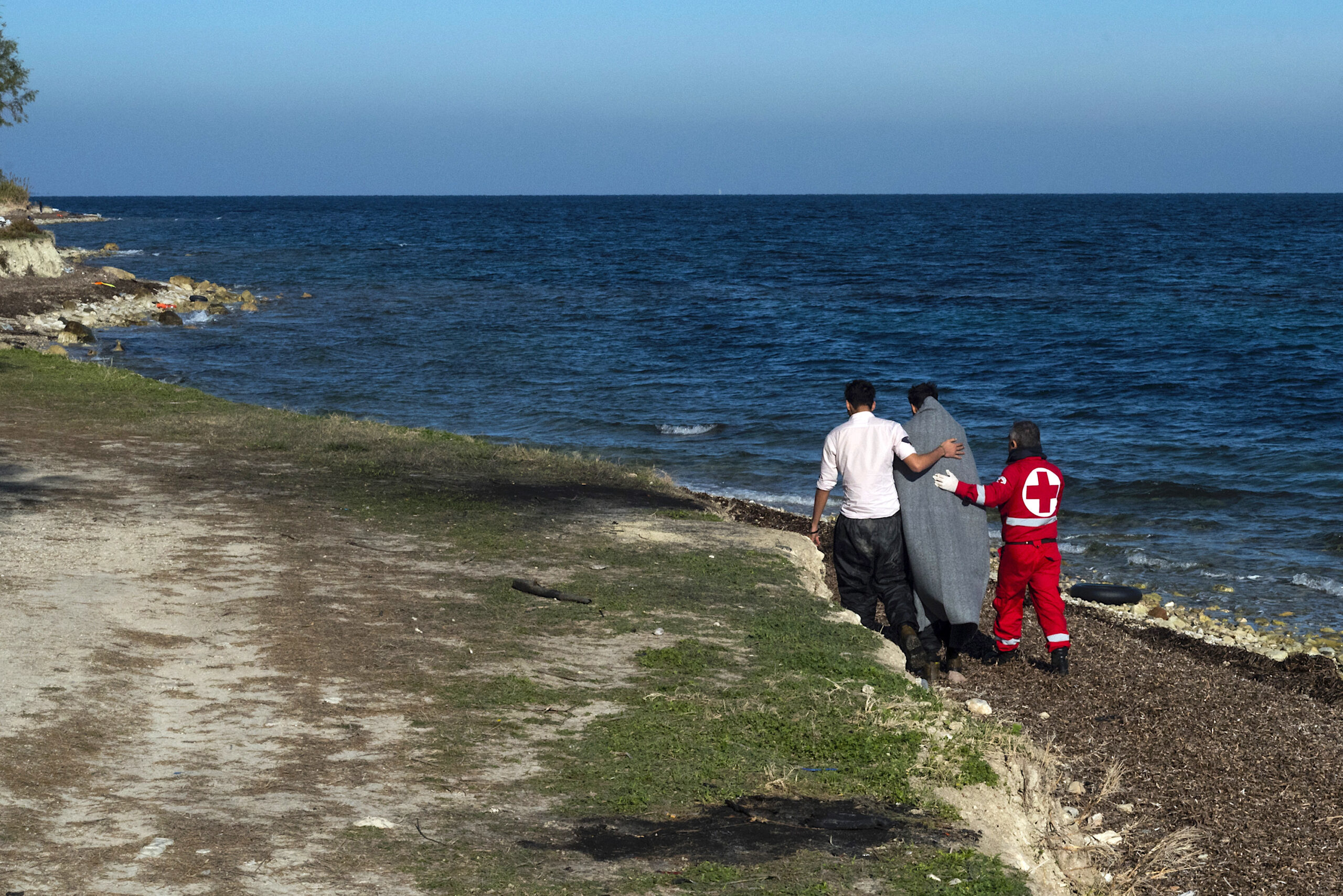The need for such a team speaks to the failure to reverse the conditions — including U.S. sanctions — that displace people in the first place, writes Phyllis Bennis.

Member of Greek Red Cross helps an Afghan refugee on Lesvos Island, December 2015. (Ggia, Wikimedia Commons, CC BY-SA 4.0)
 Of all the memorable moments from this year’s Olympics, there’s one in particular that will stay with me.
Of all the memorable moments from this year’s Olympics, there’s one in particular that will stay with me.
As the spectacular parade of lighted boats sailed up the Seine to open the games, among them was a small craft filled with 37 competitors in white uniforms. Their flag carrier was boxer Cindy Ngamba, who won the first Olympic medal for her team a few days later.
Ngamba didn’t win that bronze for her home country, Cameroon. And the flag that Ngamba and her co-flag-bearer, Yahya al Ghotany from Syria, waved proudly was not the flag of either of their countries. It was the Olympic flag.
That’s because Ngamba and al Ghotany were members of the Refugee Olympic Team, made up entirely of athletes displaced from their home countries.
From the Seine to the podium, the @RefugeesOlympic Team lit up #Paris2024, proving the sport's power to inspire, uplift and bring hope.
Competing in 12 sports, 37 refugee athletes proudly represented 120 million people forced to flee.
? https://t.co/kAzcT8bU8i pic.twitter.com/9Oyzuikj1k
— UNHCR, the UN Refugee Agency (@Refugees) August 12, 2024
The idea of an Olympic refugee team first emerged in 2016, a year of sky high global displacement — a trend that unfortunately continues today. Back then, 67 million people in the world were forcibly displaced — a population comparable to that of France and bigger than Italy or South Africa.
By the time the torch was lit in Paris for 2024, that figure had soared to 107 million. If “Refugee Nation” were a country, it would be the 15th most populous in the world — just behind Egypt.
Like the rest of this population, the athletes on the Refugee Olympic Team have been forced from their homes by some combination of war, climate change, human rights violations and economic crisis.
And this year the 37 members had something else in common: all of their home countries are facing U.S. economic sanctions.
These sanctions exacerbate the factors that are driving people from their homes. Two years before the 2016 Rio Olympics, the U.N. Human Rights Council expressed alarm at “the disproportionate and indiscriminate human costs of unilateral sanctions and their negative effects on the civilian population.”
Cindy Ngamba is a bronze medallist at #Paris2024—the first refugee in history to achieve this!#ForThe100Million #Olympics pic.twitter.com/hEH5mn4QIV
— Refugee Olympic Team (@RefugeesOlympic) August 8, 2024
In Iran, for example, the U.S. imposed extreme sanctions in 2018 when then-President Donald Trump pulled out of the Iran nuclear deal, despite the U.N. nuclear watchdog agency’s recognition that Tehran was in compliance.
The impact on Iranian civilians was dire. According to Human Rights Watch, the sanctions posed “a serious threat to Iranians’ right to health and access to essential medicines,” something especially dangerous during the Covid-19 pandemic that hit shortly after.
While the Biden administration lifted some of those Trump-era sanctions, many remain in place — and were significantly tightened in April 2024. Fourteen members of this year’s Olympic Refugee Team were from Iran.
In Afghanistan, sanctions are causing famine. In 2022, head of the International Rescue Committee and former U.K. Foreign Minister David Miliband told senators that sanctions were “the proximate cause of this starvation crisis.” Five of the Refugee Team came from Afghanistan.
These 37 athletes brought cheering audiences to their feet, on the banks of the Seine and on screens around the world.
This is the Taekwondo academy in a Jordanian refugee camp that produced an Olympian.
Yahya's journey is a powerful testament to resilience and hope.
Let's celebrate him and the rest of the @RefugeesOlympic Team competing at the #Paris2024 Olympics! https://t.co/VAkJOHrzH5 pic.twitter.com/CFsFSdpbbm
— UNHCR, the UN Refugee Agency (@Refugees) August 11, 2024
But for all the triumph and beauty of the Refugee Team — and all that these young people have accomplished despite extraordinary hardship — the stark reality is that global mass displacement has become the new normal. And whatever the specific conditions that forced each of them to leave their homes, U.S. policy is one of the factors that made things worse in their countries.
Giving these world-class athletes a chance to compete in the Olympic games was a gift — to them and to us. But at the end of the day, the need for such a team speaks to our failure to reverse the conditions that displace people in the first place — including by ending U.S. economic sanctions.
Medals are great. But wouldn’t it be better if these amazing athletes could win the right to return safely home?
Phyllis Bennis is a fellow of the Institute for Policy Studies.
This op-ed was adapted from an earlier version at CommonDreams.org and distributed for syndication by OtherWords.org.
Views expressed in this article and may or may not reflect those of Consortium News.

The Refugee
I do not belong to any one time
or to any one culture.
I am with you always. For every inch
gained in one place in one time,
for my basic dignity,
an inch or more is conceded in
another place and time.
While it seems that this need not be so,
it remains the truth
of my life, my suffering, my fate.
Atheist and idolatrous regimes,
religious pretense, market forces,
retribution and retaliation, all conspire
to take the little bit I have
and steal or destroy it and my meager means
of survival, setting me on a path of
despair. I am sometimes complicit with
these forces. I bought their lie that
violence could improve my lot. That
revolution would bring me peace. That
the trade deal would bring prosperity.
I am more often
an unwitting victim. My age, my already
tattered body, are given no consideration.
If I am starved, maimed, or killed, it
matters not.
In all likelihood, I’ll not be counted.
At best, just some general statistic
to be estimated, according to whichever
side of history is keeping tabs.
I am hopeless and lost.
If you don’t want me wandering
across your border, swimming to
your shore, then think carefully about
what you do when you consign your
proxy to the greedy, the prideful,
the moneyed interests
who can only conceive of more.
Who affirm their absolute authority.
Who are willing to exploit anyone and
anything, anywhere, and at any cost.
Their guns and bombs encircle me.
Their drones persist to remind me that
I am at their mercy—
though they have no mercy.
They are not content to leave me in
my simple existence. My poverty is
no shield to those who must wield
their reckless control.
I don’t want to be your tired and poor.
I don’t want to be another
huddled mass upon your teaming shore.
I simply want to live my life here,
devoid of the destruction brought on by
illusory moral pretense of the narcissistic,
megalomaniacs in their tit-for-tat games.
Forgive me
when my own actions have made me
complicit in such evil.
May I have the humility to love and forgive
as I leave the flaming rubble,
the stolen plot of land,
for a journey whose end is unsure.
I cannot know now, whether I will find
arms of welcome or
more rejection and death.
It will likely be the latter. Still, I
must set out, fearful and with little hope,
for it is the only choice
given to me, your refugee.
From “Looking Out onto Our World: Explorations of Power, Dogma and a World Deserving Contemplation” by TP Graf
The world’s chief belligerent hegemon, The United States and, more broadly, the West is responsible for burdening masses of people, who’s countries don’t sufficiently prostrate themselves to corporate interests. Every day, victims of brutal sanctions suffer and die. Every day, the climate crisis, caused largely by capitalist greed, threatens all life in the global South. Wars, motivated by dominance of resources and Wall Street priorities, indiscriminately spill blood, mangling bodies and spirits. And torture and genocide serve bottom line concerns of the elite class. The mere existence of an Olympic team comprised of people forced by maniacal avarice to flee their countries should be a source of shame and guilt for the U.S.A., U.K., and E.U. But a system comprised of and for sociopaths is immune to such human emotions that signal connection with others and the planet.
Wish we in the United States were able to follow this group on our televisions. Instead over and over again there was a steady
emphasis on the United States and their successes. The Olympics ought to be a global story and not a nationalistic one.
How a compassionate being could celebrate this excercise of Corporate control of ‘Olympic’ Sport for the indulgance of privileged nations at a cost of billions in a Roman like circus whilst a number of genocides are being lived streamed simultaneously across the world questions the nature of our humanity.
Seems we live in alternative realities where morality does not exist.